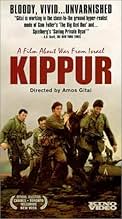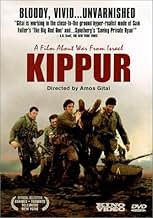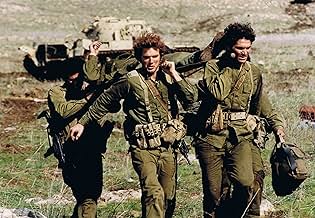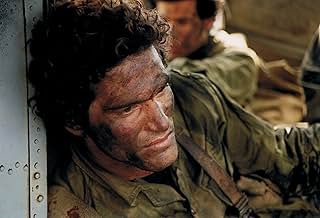IMDb-BEWERTUNG
6,3/10
2000
IHRE BEWERTUNG
Füge eine Handlung in deiner Sprache hinzuWhen the Yom Kippur War breaks out, two Israeli soldiers find themselves unable to locate their unit. Eager to take part in the war effort, they join an airborne medical evacuation unit.When the Yom Kippur War breaks out, two Israeli soldiers find themselves unable to locate their unit. Eager to take part in the war effort, they join an airborne medical evacuation unit.When the Yom Kippur War breaks out, two Israeli soldiers find themselves unable to locate their unit. Eager to take part in the war effort, they join an airborne medical evacuation unit.
- Auszeichnungen
- 2 Gewinne & 6 Nominierungen insgesamt
Uri Klauzner
- Dr. Klausner
- (as Uri Ran-Klausner)
Juliano Mer-Khamis
- The Captain
- (as Juliano Mer)
Liat Glick
- Dina
- (as Liat Glick Levo)
Noah Faran
- Rescue Commander
- (as Noach Faran)
Empfohlene Bewertungen
This is not a Hollywood film, and not an action film by any means. Its an art film, just look at the opening love making sequence. Two characters making love sopping in paint on Yom Kippur while everyone else takes part in religious activities. You dont get much more sac-religious than this. So we know this is not a propoganda film.
Despite its boredom and such, when compared to other "anti-war" films like platoon and such, this is king. Why? Because there is nothing glorifying about it or the characters, its boring, there is not a single gunshot in the whole film. Rather we spend 2 hours following a medical rescue team in a chopper hauling dead and wounded bodies into a chopper. No heroic sacrifice, no barely dodging bullets and RPG's, no cool action sequences at all. Israel needs more films like this, to see the futility of fighting wars like this. The use of long shots puts us on the outside looking in on the film, and the use of long takes helps us observe these events in real time. Specifically with the stuck in the mud scene. THe one character ironically says "this earth, this sH^&*^" When the Israeli ideology is so focused on a spiritual connection with the land, the land they feel entitled to.
Its about time that Anti-war films actually institute a feeling of real social change, and not pretend to be anti-war films conveying sacrifice and a "it was worth it" ideal. Real anti-war films do not just show the horror of blood and guts and death, they show the futility of it completely. And they are very difficult for the viewer to accept for the first time.
Despite its boredom and such, when compared to other "anti-war" films like platoon and such, this is king. Why? Because there is nothing glorifying about it or the characters, its boring, there is not a single gunshot in the whole film. Rather we spend 2 hours following a medical rescue team in a chopper hauling dead and wounded bodies into a chopper. No heroic sacrifice, no barely dodging bullets and RPG's, no cool action sequences at all. Israel needs more films like this, to see the futility of fighting wars like this. The use of long shots puts us on the outside looking in on the film, and the use of long takes helps us observe these events in real time. Specifically with the stuck in the mud scene. THe one character ironically says "this earth, this sH^&*^" When the Israeli ideology is so focused on a spiritual connection with the land, the land they feel entitled to.
Its about time that Anti-war films actually institute a feeling of real social change, and not pretend to be anti-war films conveying sacrifice and a "it was worth it" ideal. Real anti-war films do not just show the horror of blood and guts and death, they show the futility of it completely. And they are very difficult for the viewer to accept for the first time.
The Yom Kippur war almost caught Israel unawares. Twenty days later they were across the Suez 100km from Cairo and near as many from Damascus, another disaster for the Arabs. In a strange turn of events however, the surprise attack and doom-laden buildup to it, with thousands of graves dug in anticipation, had a devastating effect on the country, in effect signaling a perpetual state of fear and alert.
I am in the middle of exploring through films these bumps in the national mind, which brought me here. For what it's worth, the filmmaker has decided to capture an experience of war as purely about what it means to be there as he can. He knows, he was there.
Sadly, it's flat beyond belief. For better or worse I found it to be nothing like Thin Red Line, as others have mentioned in their comments. Whereas Malick spins war to be one of conflicting urges in the soul, this is what we see, two hours of med- evacs carrying the wounded.
There's one contemplative image in the film, a helo shot of a muddy battlefield with maneuvering tanks drawing meaningless patterns on the mud, contrasted with the early shot of the lush mingling of painted sex evocative of life, color, imagination, spontaneity. It's a great shot, and perfectly describes both what the film wants to portray, a sort of aimless cosmos, and what it ends up with—aimless doodling on the ground.
So the filmmaker reminisces in film about a time and place that allowed no skyward gaze. The important message is that war is as wasteful and pointless to happen in real life as it is to watch in this film.
I am in the middle of exploring through films these bumps in the national mind, which brought me here. For what it's worth, the filmmaker has decided to capture an experience of war as purely about what it means to be there as he can. He knows, he was there.
Sadly, it's flat beyond belief. For better or worse I found it to be nothing like Thin Red Line, as others have mentioned in their comments. Whereas Malick spins war to be one of conflicting urges in the soul, this is what we see, two hours of med- evacs carrying the wounded.
There's one contemplative image in the film, a helo shot of a muddy battlefield with maneuvering tanks drawing meaningless patterns on the mud, contrasted with the early shot of the lush mingling of painted sex evocative of life, color, imagination, spontaneity. It's a great shot, and perfectly describes both what the film wants to portray, a sort of aimless cosmos, and what it ends up with—aimless doodling on the ground.
So the filmmaker reminisces in film about a time and place that allowed no skyward gaze. The important message is that war is as wasteful and pointless to happen in real life as it is to watch in this film.
Those here who have bashed the film have grossly misunderstood Kippur. Either they look for a blow-blam-bang Holy-wood flick, which it isn't; or for a highly reliable reconstruction (which Save Private Ryan, extolled by some, is only in part: the first scene is almost like-it-really-was, the last scene is blow-blam-bang with Matt Damon and Tom Hanks instead of Chuck Norris and Steven Seagal). Kippur is a highly personal film, in that war is filtered through the very personal point of view of a sophisticated director. Amos Gitai is close to Antonioni; and in directing a war movie he couldn't forget the Lesson of the Master. Hence the minimal dialogue, hence the dilated times, hence the attention to the setting more than the characters. You try to watch Deserto rosso and then Kippur and you'll notice just how much they have in common. Then, if you don't like Antonioni, it's your own business, go for the blow-blam-bang stuff. However, as for action movies, I think Black Hawk Down is better than SPR. I may be wrong...
This movie stunk. Scenes that go on and on without any life to it. The first ten minutes shows a couple making love, covered in paint on an art canvas. There is a man walking on an empty street and it goes on and on. Two lost soldiers are driving around for fifteen minutes trying to find their unit. Boring and dull. As for the biggest invasion in Israeli history, no one seems organized or even worried for that matter. The soldiers are not wearing combat helmets in a war zone and come across as dumb and dumber. As for the conversations, they are dull and listless, void of any emotion. Honestly, I found this whole movie unrealistic and totally boring. There isn't any type of character development and the viewer has no connection to any of the characters in the movie. I was hoping for a great film, but all I got was a snore bore. I give it a three only because of some effort from the main two characters. Don't waste your time on this junk.
I disagree with most of the comments of the other commentors. This film is not a "History of Yom Kippur War" It is a very realistic attempt to see the war through a personal eyes of a Reserve Soldier suddenly called up and "Thrown" in to a War. It is 30 years since that war which is contraversial in Israel because we were caught by surprise by Egypt and Syria. On the other side within less than a month the Israeli army was 30 KM from Damascus and 100 KM from Cairo. I know people killed in that war and like other Israelis think "Kippur" shows the Trauma of that War, And any War. I have visited Egypt a number of times and Hope that, as Saadat said "The October War should be the Last War...". This is my "Apocalypse Now" movie but much more realistic.
Wusstest du schon
- WissenswertesThe film is based on director Amos Gitai's own experience of joining a helicopter rescue crew during the war of Kippur, and his helicopter being shot down by a Syrian missile on his 23rd birthday.
- PatzerMoshe Dayan did NOT lose his eye in the Sinai Desert; he lost it in Vichy-controlled Lebanon in 1941 on a reconnaissance mission on behalf of the Australian/British Army.
- VerbindungenFeatured in Sodankylä ikuisesti: Elokuvan vuosisata (2010)
Top-Auswahl
Melde dich zum Bewerten an und greife auf die Watchlist für personalisierte Empfehlungen zu.
- How long is Kippur?Powered by Alexa
Details
- Erscheinungsdatum
- Herkunftsländer
- Offizielle Standorte
- Sprachen
- Auch bekannt als
- Kippur
- Drehorte
- Nehushtan, Tel Aviv, Israel(studio: house interiors)
- Produktionsfirmen
- Weitere beteiligte Unternehmen bei IMDbPro anzeigen
Box Office
- Bruttoertrag in den USA und Kanada
- 114.283 $
- Eröffnungswochenende in den USA und in Kanada
- 17.007 $
- 5. Nov. 2000
- Weltweiter Bruttoertrag
- 114.283 $
- Laufzeit1 Stunde 57 Minuten
- Farbe
- Sound-Mix
- Seitenverhältnis
- 1.85 : 1
Zu dieser Seite beitragen
Bearbeitung vorschlagen oder fehlenden Inhalt hinzufügen

Oberste Lücke
By what name was Am Tag von Kippur (2000) officially released in Canada in English?
Antwort





























